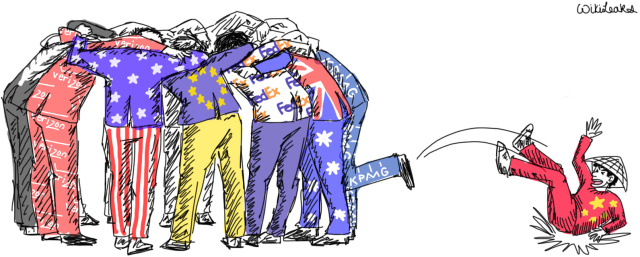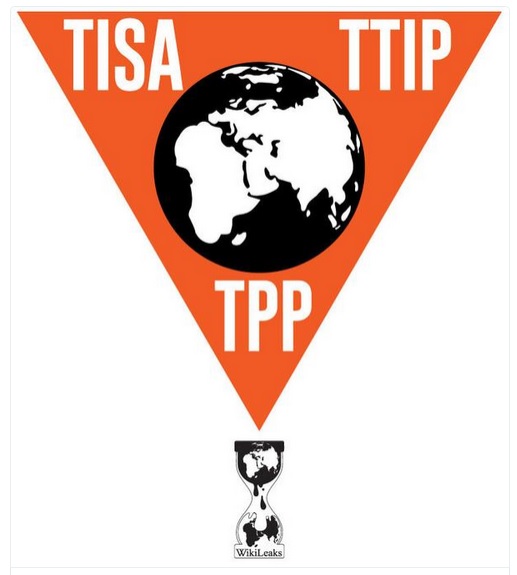
Wikileaks has released 17 secret documents relating to the Trade in Services Agreement (TISA), under discussion behind closed doors since early 2013 between the United States, the European Union and 23 other countries including Turkey, Mexico, Canada, Australia, Pakistan, Taiwan & Israel (50 countries that comprise two-thirds of global GDP). The BRICS countries—Brazil, Russia, India, China, and South Africa—are excluded from the talks.
The 17 documents released include drafts and annexes on issues such as air traffic, maritime transport, professional services, e-commerce, delivery services, transparency, and domestic regulation, as well as several documents on the positions of negotiating parties.
Article 6 of the leaked text seems to ban any country from using free software mandates: “No Party may require the transfer of, or access to, source code of software owned by a person of another Party, as a condition of providing services related to such software in its territory.” The agreement would strip existing protections which aim to keep confidential or personally identifiable data within country borders or which prohibit its movement to other countries which do not have similar data protection laws in place.
Commenting on the release, WikiLeaks founder Julian Assange said the published documents do not contain any “protection for whistleblowers or anyone else involved in publishing wrongdoing.” “It does however have a transparency chapter, but the transparency mandates that European regulators must tell transnational investors ahead of time what they are doing,” Assange said during a video conference at the European Parliament in Brussels on Thursday, adding, “that is a situation where transparency is flowing up to organizations which already have extraordinary power and not to the population of Europe.”
The agreement has been criticized for the secrecy around the negotiation. The draft has been classified to keep it secret not just during the negotiations but for five years after the TISA enters into force. “That the negotiating texts say they are supposed to stay secret for five years is quite shocking, and therefore it is really important that the text is made public,” Melinda St. Louis, international campaigns director for Public Citizen’s Global Trade Watch, told Common Dreams.
TISA is part of what WikiLeaks calls the “T-treaty trinity” – one of three trade treaties that global political leaders have been trying to agree on, alongside Trans-Pacific Partnership (TPP) and the Transatlantic Trade and Investment Partnership (TTIP).
According to the European Commission’s page, “TISA aims at opening up markets and improving rules in areas such as licensing, financial services, telecoms, e-commerce, maritime transport, and professionals moving abroad temporarily to provide services.” However, analysts warn that the deal, is aimed at further privatizing vital services. “This TISA text again favors privatization over public services, limits governmental action on issues ranging from safety to the environment using trade as a smokescreen to limit citizen rights,” said Larry Cohen, president of Communications Workers of America.
Our World Is Not for Sale warned (OWINFS) in a statement:
“The documents show that the TISA will impact even non-participating countries. The TISA is exposed as a developed countries’ corporate wish lists for services which seeks to bypass resistance from the global South to this agenda inside the WTO, and to secure and agreement on servcies without confronting the continued inequities on agriculture, intellectual property, cotton subsidies, and many other issues.
“The goal of domestic regulation texts is to remove domestic policies, laws and regulations that make it harder for transnational corporations to sell their services in other countries (actually or virtually), to dominate their local suppliers, and to maximize their profits and withdraw their investment, services and profits at will. Since this requires restricting the right of governments to regulate in the public interest, the corporate lobby is using TISA to bypass elected officials in order to apply a set of across-the-board rules that would never be approved on their own by democratic governments.”
“This text would supercharge the most powerful companies in the transport industry, giving them preferential treatment. What’s missing from this equation is any value at all for workers and citizens,” said president of the International Transport Workers’ Federation, which represents 700 unions from more than 150 countries.
Wednesday’s leak is the third time that WikiLeaks has published sections from secret trade agreements. In June 2014 it released the secret draft text for the TISA Financial Services Annex that sets rules which would assist the expansion of financial multinationals into other nations by preventing regulatory barriers. The leaked draft also showed that the US was particularly keen on boosting cross-border data flow, which would allow uninhibited exchange of personal and financial data. In November 2013 it made public a draft of TPP’s controversial Intellectual Property Rights Chapter which revealed that the agreement will have wide-ranging effects on medicines, publishers, Internet services, civil liberties and biological patents.
In December 2014, when the Associated Whistleblowing Press and Filtrala leaked a document that revealed the ugly ramifications of TISA, Rosa Pavanelli, general secretary of Public Services International warned, “The leaked documents confirm our worst fears that TISA is being used to further the interests of some of the largest corporations on earth (…) Negotiation of unrestricted data movement, internet neutrality and how electronic signatures can be used strike at the heart of individuals’ rights. Governments must come clean about what they are negotiating in these secret trade deals.”
In September 2013, 241 civil society groups from around the world aired concerns about the TISA deal: “Democracy is eroded when decision-making about important sectors– such as financial services (including banking, securities trading, accounting, insurance, etc.), energy, education, healthcare, retail, shipping, telecommunications, legal services, transportation, and tourism– is transferred from citizens, local oversight boards, and local or provincial/state jurisdiction to unaccountable trade’ negotiators who have shown a clear proclivity for curtailing regulation and prioritizing corporate profits.”







It would be good if you could publish a translation of your articles in several languages. It would extend the audiance.
Best regards
Seriously anon? I can’t read your articles without muting my speakers…
That is plan make most of us serfs, like the good old days of embargo, and the Queen and the damn tea. The solution is we spend the money and monopoly is a game, we the people do life.
They can plot their fiendish plots but do the math.
Imagine a coupe of all 17 players? Do the Math.